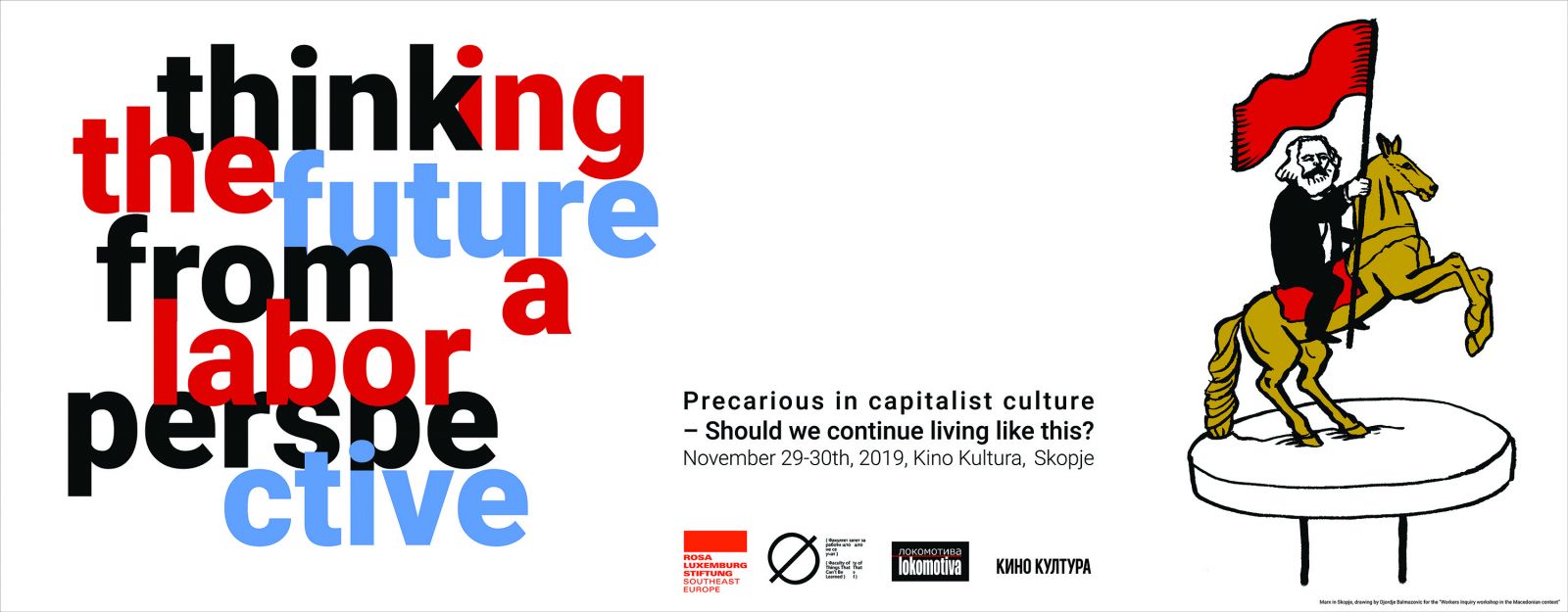PRECARIOUS IN CAPITALIST CULTURE
SYMPOSIUM ON THINKING THE FUTURE FROM A LABOR PERSPECTIVE | 29 - 30 NOVEMBER 2019
Curated by Ivana Vaseva
Speakers: Antonia Alampi, Kristina Ampeva, Corina L. Apostol, Djordje Balmazović, Karla Crnčević, Iliana Fokianaki, Vladan Jeremić, Filip Jovanovski, Violeta Kachakova, Biljana Tanurovska – Kjulavkovski, Krunoslav Stojaković, Tara Rukeci, Bojana Piškur, Tjaša Pureber, Kire Vasilev

When it comes to labor rights, cultural workers are in a particularly desperate condition, because their work often is not regarded as labor and is not valorized as such. The exploitation and marginalization of cultural work, as well as the overall lack of understanding of the emancipatory potential of arts and culture, is rarely addressed as an issue in need of systemic change. For decades now, neoliberal austerity measures push artists and cultural workers into short-term contracts or freelance relations. Often unpaid, they do not even earn a living wage, and most of them live in a cycle of debt and poverty.
Unequal and precarious labor conditions are also evident in other sectors in North Macedonia and the region. In the transition to post-socialism, Yugoslavia’s big factories were dispersed into hundreds of private companies that took advantage of cheap labor in the race for profit in a strong rivalry with their competitors. The unchallenged neoliberal discourse penetrated society and labor relations changed, union activities have been oppressed and labor legislation has been neutralized. All this led to the neglect of labor rights and living wages. The state institutions lack systematic procedures and political resolutions that would foster emancipatory culture and improve the labor rights of precarious cultural workers and all workers in general.
How can precarious cultural workers organize to struggle for better working conditions in this context? What kind of artistic and cultural production can support the struggle for labor rights and make emancipatory social movements stronger in the future?
This symposium brings together actors from the region and across Europe with institutional, non-governmental and non-institutional backgrounds from the field of culture and art, as well as people who are part of social movements and activists for labor rights, to exchange experiences, discuss existing models and share strategies for labor organization in culture and art.
Starting from the analysis of precarity and freelance working relationships in culture and elsewhere, the symposium will discuss possible new relations of cultural production beyond neoliberal, conservative and ethno-nationalist paradigms. Here, the artistic and cultural context needs strong input from the side of emancipatory forces in society. For this, examples of emancipatory practices in culture in the context of labor struggle will be presented, the function and capacities of public institutions and resources will be discussed, and possibilities of transnational organisation will be addressed.
Organized by Faculty of things that can’t be learned (FR~U), North Macedonia in partnership with Lokomotiva- Centre for New Initiatives in Arts and Culture and Rosa-Luxemburg-Stiftung Southeast Europe.
